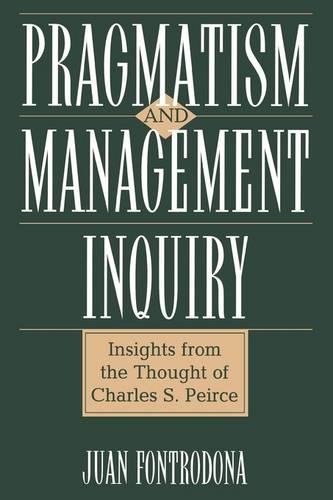
Pragmatism and Management Inquiry: Insights from the Thought of Charles S. Peirce
(Hardback)
Publishing Details
Pragmatism and Management Inquiry: Insights from the Thought of Charles S. Peirce
By (Author) Juan Fontrodona
Bloomsbury Publishing PLC
Praeger Publishers Inc
28th February 2002
United States
Classifications
Tertiary Education
Non Fiction
Management and management techniques
Philosophy
658.001
Physical Properties
Hardback
232
Width 156mm, Height 235mm
567g
Description
A cool, lucid examination of the thought of the American philosopher Charles S. Peirce, offering an important clarification and an innovative way to view human actions and the way management is practiced. Dr. Fontrodona examines the thought of the American philosopher Charles S. Peirce--who in 1872 gave name to a group of ideas that came to be known as "pragmatism"--and emerges with an important clarification and an innovative way to view human action and the practice of management. Peirce denied that as it was commonly understood, pramatism represented the triumph of pure effectiveness. Rather, it involves processes by which people, through action, reveal and develop themselves, and this involves virtues and values. Good managers are not just effective, they do not simply get things done, but they are ethical--they do the right things. Dr. Fontradona also shows how out of pragmatism's sense of purpose a way can be found to define a theory of decision. As Dr. Michael Hoffman says in his Foreword, Peirce and Fontradona both find that action is understood and judged not only through operational techniques, but through intentions and the moral values that formulate and drive those intentions. "Fontradona has produced a book of immense richness and value," he writes. "It exposes...a fundamental truth of not only management theory but of all human action--that successful endeavor, which furthers the progress of business and of civilization generally, is dependent on the proper balance and dynamics of individulas, institutions, and integrity. [It] is not only a book for business and for scholars of Peirce, but truly a work with wisdom for living life itself." The book is divided into three parts. In the first part, Dr. Fontrodona focuses on the concept of action, based on some of the central features of Peirce's thought. He considers human action not only from the viewpoint of its effectiveness, but also from its purposefulness. Human action, he asserts, is characterized by being driven by an intention, and this becomes explicit through the decision making process. Dr. Fontrodona turns to this in Part II. He says that Peirce's thought about the nature of science allows us to consider that although management is eminently practical, it is based on a scientific approach. Then, in Part III, he presents three principles for human action drawn from the three normative sciences: creativity, based on logic; community, based on ethics; and character, based on aesthetics. He argues that creativity is the result of the logic of abduction, and contrasts with the instrumental rationality of the modern scientific method. Community emphasizes the social nature of knowledge, instead of the individualism of the modern moral attitude. And character proposes that human development is the ultimate end of human action taken against material enrichment. To close his book, Dr. Fontradona questions the presence of these principles in the commonly accepted, current models of management.
Reviews
Those willing to discover the nature of management at a very theoretical level should be forewarned: this book is 80 percent about Peirce's pragmatic philosophy of human action, intelligent problem solving, and the principles of scientific inquiry. But having mastered that pragmatic perspective, what a world is opened to view! The rest of this book is a provocative exploration of central issues in management science. Most important, it locates moral decision making at the heart of organizational theory. Recommended for libraries maintaining business and management collections; upper-division undergraduates through practitioners.-Choice
"Those willing to discover the nature of management at a very theoretical level should be forewarned: this book is 80 percent about Peirce's pragmatic philosophy of human action, intelligent problem solving, and the principles of scientific inquiry. But having mastered that pragmatic perspective, what a world is opened to view! The rest of this book is a provocative exploration of central issues in management science. Most important, it locates moral decision making at the heart of organizational theory. Recommended for libraries maintaining business and management collections; upper-division undergraduates through practitioners."-Choice
Author Bio
JUAN FONTRODONA is Assistant Professor of Business Ethics at IESE Business School, Barcelona. He holds an MBA and a doctorate in philosophy and has had visiting professorships, fellowships, and scholarships at Harvard Business School and the Center for Business Ethics, Bentley College. In his research and various publications, Fontrodona combines the study of the theoretical foundations of management with the ethical implications of the daily conduct of business and has explored these and other topics in his various books and journal articles.
